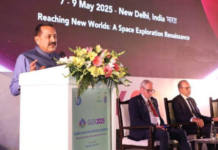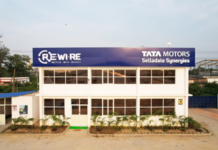New Delhi– India on Tuesday said it has expressed its concern to the US over a bill to change rules on H-1B visas that will impact the IT industry and Indian techies working in America.
“India’s interests and concerns have been conveyed both to the US administration and the US Congress at senior levels,” said External Affairs Ministry spokesperson Vikas Swarup in New Delhi.
The High-Skilled Integrity and Fairness Act of 2017, introduced in the House of Representatives by California Congressman Zoe Lofgren on Monday, calls for doubling the minimum salary of H-1B visa holders to $130,000 from the current minimum wage of $60,000 – a move that could impact Indian techies.
The bill, likely to be signed by President Donald Trump, would make it difficult for firms to use the programme to replace American employees with foreign workers, including from India, with lower wages.
The bill would require that employers first offer a vacant position to an equally or better qualified American worker before seeking an H1B or L-1 visa holder.
It would also establish wage requirements for L-1 workers and improve H1B wage requirements to encourage companies to hire qualified American workers and prevent them from using foreign workers as a source of cheap labour.
H1-B visas are issued to qualified professionals. A related visa is the L-1, which is given to employees of a company who are transferred to the US. Both of them are used extensively by Indian companies.
According to ComputerWorld magazine, nearly 86 per cent of H1-B visas for computer-related jobs and 46.5 per cent for engineering positions were given to Indians.
The US issues 85,000 H1-B visas every year, of which 20,000 are for master’s degree holders from US universities. Because of the large number of applicants – 236,000 in 2016 – the H1-B visas were issued through a lottery system.
As the export-oriented industry’s representative body, Nasscom, said the reform bill was fraught with challenges due to provisions that would nullify its objective of saving American jobs.
“The Lofgren Bill contains provisions that may prove challenging for the Indian IT sector and leave loopholes that will nullify the objective of saving American jobs,” asserted Nasscom in a statement here.
The US market generated about 60 per cent of the $108-billion export revenue for the $143-billion Indian IT industry for the last fiscal (2015-16).
Nasscom’s revised export guidance is $117-119 billion for this fiscal (2016-17).
“Though the bill has to go through an extensive legislative process at the US Congress and the Senate for becoming law, it does not treat all IT service firms with H-1B visa holders equally and the provisions are biased against H-1B dependant firms,” asserted Nasscom President R. Chandrashekhar in a statement here.
Assuring the industry of engaging with the US administration and its lawmakers through the Indian government, the former IT secretary said the apex body would highlight their value contribution as a ‘net creator’ of jobs in the US.
“The Indian IT sector has helped American businesses by providing high-skilled IT solutions in order to innovate, open new markets, expand their operations and creating thousands of new jobs for Americans,” claimed Chandrashekhar.
The bill also does not address the acute shortage of STEM-skilled workers in the US, which led all companies to have a calibrated hiring of locals and bridging the skills gap with skilled workers on non-immigrant visas, including H-1Bs.
STEM is an acronym for Science, Technology, Engineering and Mathematics.
Echoing the Indian government’s and the industry’s concerns over the reform visa bill, Tech Mahindra Chief Executive C.P. Gurnani, however, hoped things would become better once Prime Minister Narendra Modi meets Trump in June.
“President Trump (already) had a conversation with Modi. I am sure they will meet very soon. Both of them have a background (Trump has a background of running businesses and Modi is a pro-business prime minister) and both will definitely find a meeting ground,” Gurnani told BTVi in an interview.
Reiterating that Modi was not shy of raising issues, Gurnani said he believed the meeting could happen as early as June and there could be a positive outcome.
“India-incorporated IT companies have invested around $2 billion in the US and are able to create about 100,000 jobs in America,” added Gurnani.
The legislation, Lofgren said, removes the “per country” cap for employment-based immigrant visas so that all workers are treated more fairly and to move to a system where employers hire the most skilled workers without regard to national origin.
“It (bill) offers a market-based solution that gives priority to those companies willing to pay the most. This ensures American employers have access to the talent they need, while removing incentives for companies to undercut American wages and outsource jobs,” she said.
Trump’s spokesperson Sean Spicer said H-1Bs and other visa are “a part of larger immigration reform effort that the President would continue to talk about through executive order and through working with Congress.”
“There is an overall need to look at all these programmes and you will see both through executive action and through comprehensive legislative measures, a way to address immigration as a whole and the visa programmes,” said Spicer.
Before assuming office in January, Trump said one of his first tasks would be to issue an executive order for the Labour Department to investigate visa abuses that he asserted undercut the wages of American workers.
Along with H1-B, Spicer mentioned spousal and others as categories of visas that Trump may act on.
In 2015, President Barack Obama’s administration permitted spouses of H1-B visa-holders to get permission to work. (IANS)






